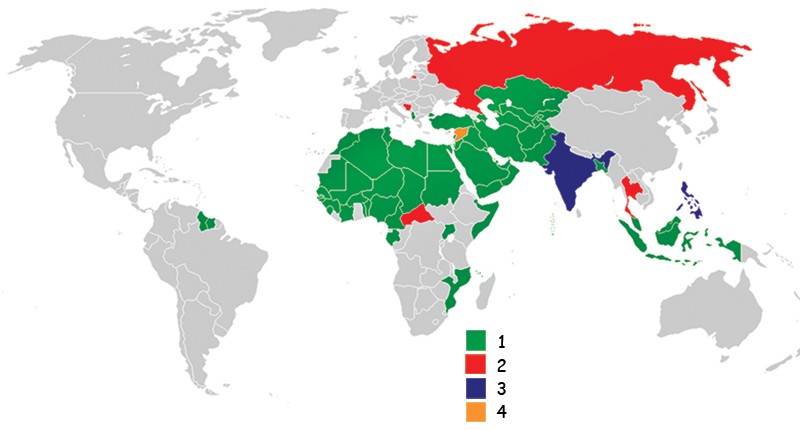Chapter 11 - Differences Can Become Richness
This article was published on Burma Times on May 25th, 2014
There are many organizations and bodies founded for different purposes in the world, and very different countries belong to them.
Countries can easily come together for reasons such as geographic necessity, defense, trade or political partnership.
Countries belonging to such bodies as the Islamic Cooperation Organization, the World Trade Organization, the Organization for Security and Cooperation in Europe, the Economic Cooperation Organization, UNESCO, the European Union, the Shanghai Cooperation Organization, the United Nations, the World Health Organization and NATO are able to act together in the light of common interests and needs.
Some of the common objectives sought by means of these organizations are to maintain peace and territorial integrity, to improve trade, the provision of public education, political independence and security or humanitarian aid.
However, famine, civil wars and economic difficulties down the years show us that these organizations have been unable to fully discharge their responsibilities.
Yet nobody then says that countries should not establish such unions; the failure to achieve the intended objectives through such organizations does not prevent new ones being set up.
Even if definite outcomes are not achieved, different organizations are highly active and holding meetings in the light of their own interests in many different regions. These activities, which may be described as "better than nothing," nonetheless point to one very important truth:
Cooperation is essential for everyone. The opposite, that is, conflict and disagreement, result in weakness and failure. Unity, on the other hand, facilitates the attainment of common aims.
Muslims, who are 'brothers' in the view of the Qur'an, also have an obligation to be united and to avoid division and separation.
God loves those who struggle in His Way in ranks like well-built walls. (Qur'an, 61:4)
 | |
| 1. Member States | |
| The distribution of the countries in the Organization for Islamic Cooperation of 57 countries, established to protect the rights and interests of the Islamic world. Such organizations must work together with each other under the guidance of the Qur'an so that they can be a unifying force for the Islamic world. | |
What needs to be done to that end is clear. According to this verse, Muslims must:
◉ First and foremost be devoted to their brothers with love and affection;
◉ Avoid argument and disputation;
◉ Be one another's friends and guardians;
◉ Watch over and protect one another under all circumstances;
◉ Advise and consult one another;
◉ Strive together intellectually against unbeliever ideologies in ranks like well-built walls.
The opposite, in other words:
◉ Being divisive instead of unifying;
◉ Setting Muslims against one another;
◉ Exacerbating disagreements instead of calming them down;
◉ Not treating their Muslim brothers with love and affection;
◉ Not being forgiving and protective, and
◉ Not helping Muslims in the intellectual fight against unbeliever systems is unlawful.
Muslims must not forget the fact that Islamic moral values mean they are brothers, regardless of their differences. Believers' ethnicity, linguistic or sectarian differences or the lifestyles in their respective countries, cannot harm that brotherhood.
Muslims in Myanmar, Palestine, America, India, Turkey or Africa must always act with one heart. They must speak out against the repression in East Turkestan, for instance, and support the people there. They must be the first to send aid to Afghanistan if an earthquake strikes. They must seek to make the voices of the children being shelled in Syria heard by the world. They will think of the orphans in Rakhine and start aid campaigns for them. In doing that, they must not consider which sect they belong to, and differences of language will not constitute a problem.
Differences are a source of beauty, they are a great richness; they must never be made a reason for conflict. Muslims must turn to urgent matters, in other words, working together and attach no credence to those who seek to instigate divisions.
Mankind! We created you from a male and female, and made you into peoples and tribes so that you might come to know each other. The noblest among you in God's Sight is the one who is most deeply conscious of Him. God is All-Knowing, All-Aware. (Qur'an, 49:13)
If differences and divisions are regarded as trivial, and if brotherhood is emphasized, this will, by the will of God, be instrumental in opening the roads to world peace.
 |
- Introduction - When the Migration Wave Starts to Wash Ashore
- Chapter 01 - Open Letter to the Burmese (Myanmar) Administration
- Chapter 02 - Events in Myanmar Are Crime Against Humanity
- Chapter 03 - A Cry for Help to the U.N. from Rohingya of Myanmar
- Chapter 04 - Behind the Persecution in Myanmar
- Chapter 05 - Myanmar Should Beware of Radicalism
- Chapter 06 - Deafening Silence over Rohingya Issue
- Chapter 07 - Rohingya People Ignored by Myanmar Government
- Chapter 08 - Why Does the World Turn a Blind Eye on Children's Cries Coming from a Far Corner in Southeast Asia?
- Chapter 09 - Are the Rohingyas Doomed to Remain Stateless?
- Chapter 10 - The Rohingya Muslims Are Being Exiled in Their Own Lands
- Chapter 11 - Differences Can Become Richness
- Chapter 12 - What If You Didn't Have Even an Inch of Land to Live on in This World?
- Chapter 13 - Not the Rohingya Crisis, but a Crisis of Humanity
- Chapter 14 - Are the People of Rakhine Condemned to Be Oppressed in the Countries to Which They Flee?
- Chapter 15 - Being a Muslim Woman in Myanmar
- Chapter 16 - How Does It Feel to Be a Rohingya?
- Chapter 17 - Small Steps That Could Make a Big Difference
- Chapter 18 - The Only Solution to the Refugee Crisis That Shook the World
- Chapter 19 - Rohingyas' Uncertain Fate Post-Polls
- Chapter 20 - Time for Global Community to Step up for Myanmar's Muslims
- Chapter 21 - Humans Have Rights on Paper, but Apparently Not in Real Life
- Chapter 22 - The Forgotten Rohingya
- Conclusion - Unity among Muslims Is the Most Vital Issue
